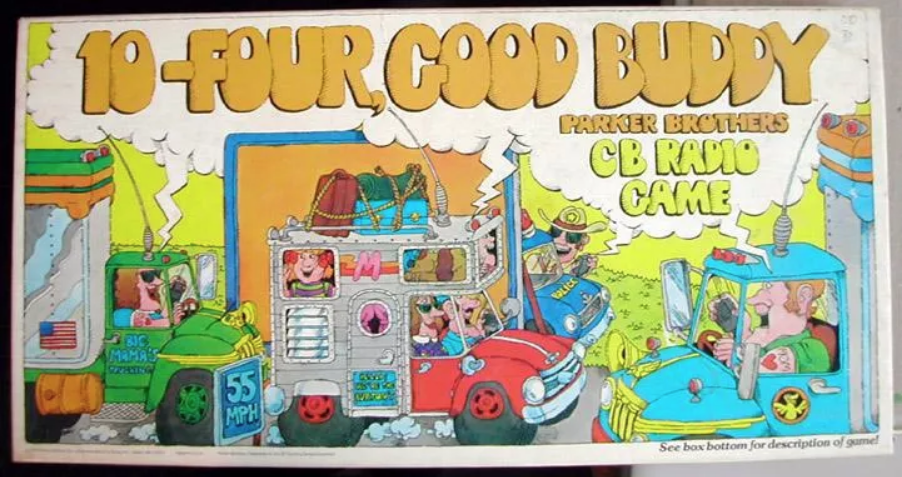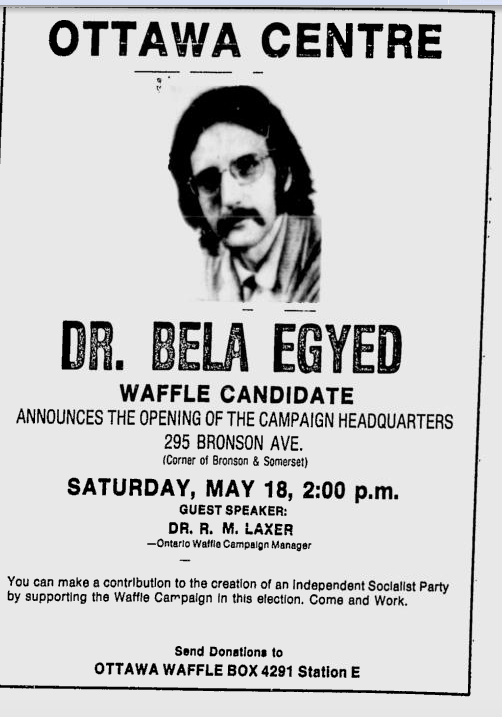1970s
10-Four, Good Buddy Board Game
Did any fad ever evaporate as quickly as CB radio?
Learn details here.
Posted By: Paul - Sat Apr 10, 2021 -
Comments (3)
Category: Fads, Games, Motor Vehicles, Technology, 1970s
Christina Gregg, “Sex Exercise”
Just one cut from the whole album, as seen here at Discogs.
A little clip of our instructress.
Posted By: Paul - Tue Apr 06, 2021 -
Comments (1)
Category: Exercise and Fitness, Movies, Sexuality, 1970s
Combined Clothes Hanger and Radio
It's fairly common to use metal clothes hangers to extend the range of a radio's antenna. So John Jerome Spina had the idea of combining the radio and clothes hanger into one. The metal of the hanger would serve as the antenna. He was granted a patent for this invention in 1978.I'm not sure he thought through what would then happen if you hung something on the hanger, such as a coat.

Posted By: Alex - Sun Mar 28, 2021 -
Comments (1)
Category: Inventions, Patents, Radio, Technology, 1970s
Bic Disposable Pantyhose
1976: The Bic Pen Corp. decided to branch out into the women's underwear market by introducing a line of disposable pantyhose. The thinking was that their company was already known for making disposable pens and lighters. So why not disposable pantyhose as well? Plus, they figured that female secretaries would be keen to order pantyhose together with other office supplies.
This is now considered to be a classic marketing failure. Matt Haig writes in his book Brand Failures:
The main problem was that the company insisted on using the Bic name. As marketing writer Al Ries has observed, using the same name in unrelated categories can create difficulties. "If you have a powerful perception for one class of product, it becomes almost impossible to extend that perception to a different class," he argues.
The company apparently didn't learn much from this failed product, because in 1989 it introduced Bic Perfume, which is considered to be another classic business blunder.

Chicago Tribune - Apr 3, 1976
Posted By: Alex - Thu Mar 18, 2021 -
Comments (3)
Category: Business, Products, Underwear, 1970s
The Barkleys
Cartoon version of ALL IN THE FAMILY.
Posted By: Paul - Fri Mar 12, 2021 -
Comments (2)
Category: Animals, Domestic, Family, Homages, Pastiches, Tributes and Borrowings, Cartoons, 1970s, Parody
A Family Circus Christmas
I was going to save this for Christmas 2021, but then realized I should not deprive anyone of immediate viewing of this masterpiece.The IMDB page.
Posted By: Paul - Sun Mar 07, 2021 -
Comments (3)
Category: Family, Fey, Twee, Whimsical, Naive and Sadsack, Holidays, Ineptness, Crudity, Talentlessness, Kitsch, and Bad Art, Newspapers, Cartoons, 1970s
Fly Cheryl
An infamous ad campaign created by Forest William Free for National Airlines. Info from the Hudson River Valley Institute:



Posted By: Alex - Wed Mar 03, 2021 -
Comments (3)
Category: Innuendo, Double Entendres, Symbolism, Nudge-Nudge-Wink-Wink and Subliminal Messages, Advertising, 1970s
Cefacidal Promotional Playing Cards

Almost the whole set is here.
Posted By: Paul - Wed Feb 24, 2021 -
Comments (0)
Category: Games, Medicine, Advertising, 1970s, South America
The Human Relationship Simulator
This post seemed appropriate for Valentine's Day, since it's about an engineer's attempt to use machine logic to improve the "ambiguities of the woman/man relationship".James F. Hollander was a patent attorney with a degree in electrical engineering. In the late 1970s he invented and patented what he called the "Human Relationship Simulator". It consisted of a box with various dials.
Even after reading his patent, and an article about his invention, I'm not exactly sure how the thing operated. From what I can gather, if a couple were having an argument, or needed to make a decision (such as where to go for dinner), they could both adjust dials on the Simulator, and it would give them an answer. And measure the intensity of their feelings.

Here's more info from a 1977 article in the Asbury Park Press:
Each subject uses dials that represent four areas — compliance with society, attention to own desire, social pressure and personal inclination. The personal inclination and social pressure gauges are intricately detailed to show adamant 'yes' or 'no' responses, or degrees such as strong preference, or very much or some.
Attention to desire is measured in readings of low, medium and high, as is compliance with society.
As the subjects feed this information into the panels, other gauges measure tension, feelings, guilt or pride, emotional independence, like and dislike, and influence, based on each decision.
The machine does the thinking, lights a decision of 'yes' or 'no' and tells the subjects their emotional responses....
In a marriage situation, Hollander said the device could show the individuals why something is going wrong in the relationship if arguments are portrayed and feelings defined.
"I wanted to pick out the ambiguities of the woman/man relationship," he pointed out.

Asbury Park Press - Aug 29, 1977
If that doesn't seem entirely clear, then here's a sample from Hollander's patent:
Posted By: Alex - Sun Feb 14, 2021 -
Comments (0)
Category: Technology, Patents, Psychology, Marriage, 1970s, Love & Romance
The Waffle Party
With all this talk of rogue Republicans forming a new party, I hope they choose a name as evocative as that of Canada's The Waffle.
Source.
Posted By: Paul - Fri Feb 12, 2021 -
Comments (1)
Category: Odd Names, Politics, 1960s, 1970s, North America

| Who We Are |
|---|
| Alex Boese Alex is the creator and curator of the Museum of Hoaxes. He's also the author of various weird, non-fiction, science-themed books such as Elephants on Acid and Psychedelic Apes. Paul Di Filippo Paul has been paid to put weird ideas into fictional form for over thirty years, in his career as a noted science fiction writer. He has recently begun blogging on many curious topics with three fellow writers at The Inferior 4+1. Contact Us |




